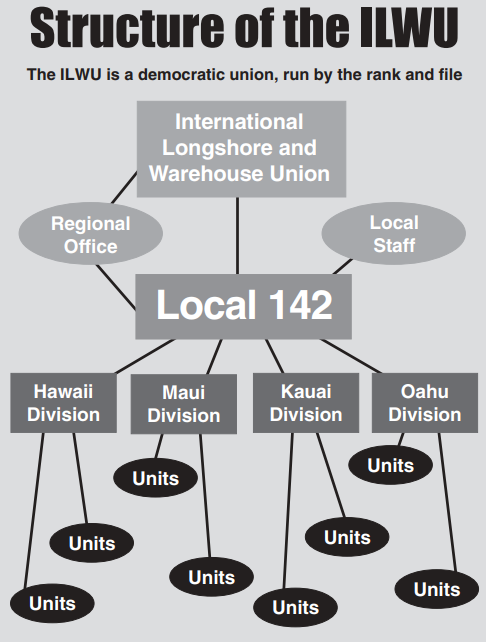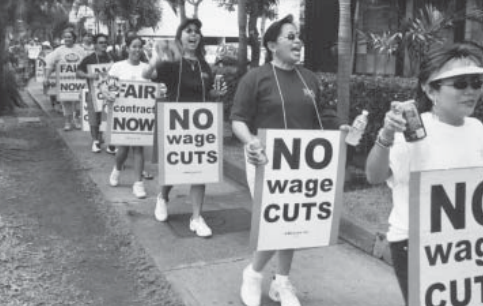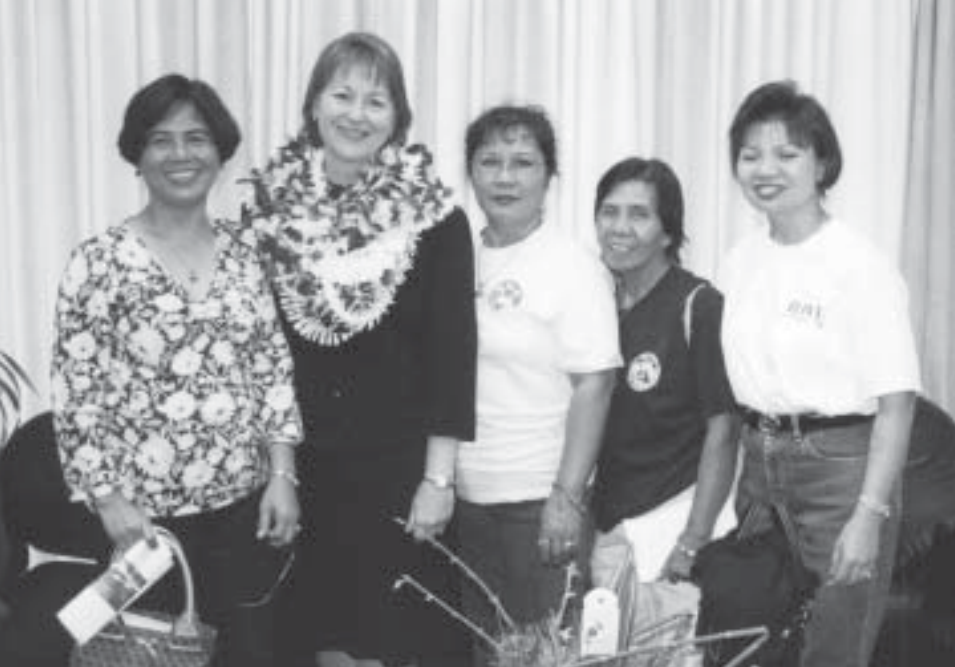Local 142 is the one of 65 separate unions which make up the ILWU. These local unions are located in California, Oregon, Washington, Alaska, Canada, and Hawaii. Most of these locals were part of the ILWU since the 1930s and share the same principles of a democratic union run by the membership. Each local union could operate on its own, but has chosen to be part of the ILWU.
Each local contributes money What is “Local 142”? to run the overall ILWU organization, which is called the International ILWU or just International. The headquarters of the International is located in San Francisco, California.
Local 142 is based only in Hawaii. We have our own officers, constitution, and structure. Our headquarters are located in Honolulu at 451 Atkinson Drive. Local 142 is made up of four divisions based on the four counties of Hawaii, Maui, Kauai, and Oahu.


ILWU members, including Local Vice President Donna Domingo (second from right) and others rallied to support workers at the New Otani Kaimana Beach Hotel in Waikiki on Jan. 19, 2004. The workers at the 125-room hotel joined the ILWU in March 2003 and have been negotiating their first union contract.
A Guide to the ILWU what every member should know
Welcome to the ILWU!
As a member of ILWU Local 142, you are part of a long and proud tradition where workers join or form organizations for their mutual benefit and to promote fairness and justice on the job. These organizations are called labor unions, trade unions, or just unions.
In Hawaii, one out of every four workers are members of a labor union. The most common kind of union is based on the job the worker does. For example, there are unions of airline pilots, firefighters, bricklayers, teachers, and nurses, and only workers who do those jobs are members of those unions. Another kind of union is based on an entire industry—such as hotel workers, government employees, or postal workers. A third kind of union, like the ILWU, organizes and includes workers from many different industries. This kind of unionism brings the highest level of unity to workers.
There are 22,000 ILWU members on all major islands in Hawaii, which makes the ILWU one of the largest unions in Hawaii. ILWU members work in every major industry including: tourism, longshore, sugar, pineapple, manufacturing, transportation, and hospitals. ILWU members hold diverse jobs—they include mechanics, drivers, cooks, hotel housekeepers, store cashiers, computer clerks, hospital technicians, and more.
The scoop on . . .
Unions in the United States
In the United States, there are 148 unions representing 15.8 million workers. This is about 13% of the workforce. Thirteen million of these workers belong to the 65 unions affiliated with the AFL-CIO.
The ILWU is affiliated with the AFL-CIO. Hawaii is the second most unionized state in the country-- 23.8 percent of Hawaii’s workers are unionized. New York is the most unionized state with 24.6 percent of their workers in unions. Alaska is the third most unionized state at 22.3 percent, followed by Michigan with 21.9 percent of workers in unions.
What do the letters stand for?
The letters I.L.W.U. stand for International Longshore and Warehouse Union, , a union created in 1934 when longshore and warehouse workers on the West Coast of the United States merged to form a single union.
In 1937, longshore workers in Hawaii choose to join up with the ILWU, because it was a democratic union that stood for racial equality within its membership. This was important to the Hawaii members who were mostly of Hawaiian and Asian ancestry.
Within a few years, tens of thousands of sugar and pineapple workers also joined the ILWU, attracted by the union’s program of uniting all ethnic groups and its reputation as a democratic union run by the membership. Before the What do the letters stand for? ILWU, unions in Hawaii organized workers along craft or ethnic lines. This divided the working class, and such unions were no match against the powerful employer group that controlled the islands.
With the ILWU, workers finally had an organization with the strength and solidarity that could match the power of the employers. ILWU members won job security and improvements in wages and benefits. With their jobs protected, ILWU members registered to vote, got involved in community affairs, and elected candidates who would work for legislation to benefit working people. This opened the way for Hawaii to develop into a progressive, democratic society.
Get involved in your union
Know your rights. Read and understand your rights and benefits under the union contract and the ILWU Constitution. You can get copies from your union representative. Take an active part in shaping your working life. Get to know your union stewards and get involved with union activities. The union is only as strong as its members.
Come to union meetings. You’ll learn about your rights as a working person. It’s an education that will make you a better person and your employment at your company more rewarding and enjoyable. Your participation in the union is always welcome and you will be glad you got involved. Meeting notices are posted on the union bulletin board, along with other important announcements. Make it a practice to regularly read the notices on the union bulletin board.
You have rights on the job
As a member of a union, you have rights on the job. With the ILWU you have the combined strength and experience of the union on your side.
You have the right to have a union steward or business agent help you with any problem on the job. You have the right to ask for a union representative if the company calls you into a meeting which may lead to disciplinary action.
You put yourself at a disadvantage when you try to settle a problem by yourself, or when you fail to let your union know of problems you and your fellow workers have.
If you have a question or problem on the job, the first thing you should do is talk to your on-the-job union steward.
Your company is called a “unit” within the ILWU structure. Each unit has its own elected officers and union stewards, who serve as volunteers. They get no special treatment or privileges from the company or from the union, but they are ready to help you and your fellow workers.

Teams of ILWU members called on State lawmakers on the opening day of the 2004 Legislative Session on January 21. The strong presence of the ILWU serves as a reminder to legislators that the union and its members are deeply concerned about politics and will work hard to protect the interests of working families. (L-r, above) Josie Corpuz, Senator Roslyn Baker, Perlita Manlangsing, Rose Corpin, and Lourdes Rivera.
The scoop on . . .
What to do if you need help
The company may have House Rules, Standards of Conduct, Dress Codes and work policies that are separate from the union contract. These are the company’s rules, however, the union may get involved if you are disciplined as a result of any of these rules or if these rules are unfairly applied, are unreasonable, or unrelated to the business objectives of the company.
If you are given an oral or written warning or are disciplined by management, you should contact your union representative immediately. You have a right to ask for a union representative, if you are called into a meeting with management and you believe the meeting may result in disciplinary action.
The company may not discipline or discharge any employee, except for just and proper cause. Just and proper cause involves the following principles:
1. The company must give the employee forewarning or foreknowledge of the possible or probable disciplinary action as the result of the employee’s conduct.
2. The company’s rule must be reasonably related to the orderly efficient and safe operation of the employer’s business, and the performance that the company might properly expect of the employee.
3. Before administering discipline to an employee, the company must make an effort to discover whether the employee did in fact violate or disobey a rule or order of management.
4. The company’s investigation must be conducted fairly and objectively.
5. When the company conducts its investigation it must obtain substantial evidence or proof that the employee was guilty as charged.
6. The company must apply its rules, orders and penalties evenhandedly and without discrimination to all employees.
7. In determining the degree of discipline the company must show that the penalty is reasonably related to the seriousness of the employee’s proven offense and shall consider the employee’s record of service and length of employment with the company.
The union will work on your behalf to investigate if the company acted properly in taking disciplinary action against you. If you are disciplined, there is a time limit within which to contact the union and have the union file a grievance. Because of this time limit, do not delay. Contact the union representative as soon as you can.
